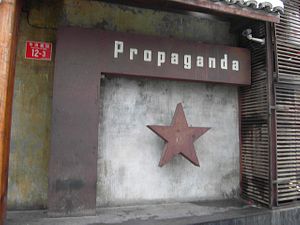The 19th National Congress of the Communist Party of China (CPC), the most important political event which will decide CPC’s top leadership, will be held in Beijing later this year. Also this year, China will celebrate the 90th anniversary of the founding of the People’s Liberation Army (PLA) on August 1.
In order to better welcome the two big events, China’s main media censor, the State Administration of Press, Publication, Radio, Film, and Television (SARFT) announced recently a ban on entertainment shows in the “major propaganda period.” Instead, SARFT “recommended” a series of propaganda shows as the replacement.
The announcement was addressed toward all local media regulators as well as all TV stations nationwide. Straightforwardly, the announcement said:
To better welcome the major propaganda period of 19th Party Congress and the 90th anniversary of the Army Day, under the deployment of the Central Propaganda Department and SARFT, SARFT has picked up a series of propaganda TV shows for all the TV stations to buy and broadcast.
Although SARFT said the series of propaganda shows were only recommended to the TV stations, it’s noteworthy that in China, all TV stations, managed by the government, are overseen by SARFT.
Then the announcement put forward three major requirements:
- The announcement required all the local regulators, upholding a strong comprehensive and political view, to enforce the management of propaganda TV series’ creation, designing, and broadcasting, so as to guarantee the the propaganda shows could be broadcast on time and to create a good atmosphere in the major propaganda period.
- It required all the local regulators to strictly guide the shows’ political views and values, making sure all the good TV series could be broadcast safely. Thus, no entertainment shows such as ancient costume dramas and idol dramas should be broadcast, so as not to damage the good atmosphere.
- It required all the TV stations to buy these recommended propaganda shows and broadcast them in prime time.
According to the list of recommended shows, most are either about the anti-Japanese war (China’s name for World War II) or patriotism education.
The announcement immediately triggered a big wave of criticism and sarcasm from Chinese netizens.
One netizen commented under the news report on Weibo (Chinese equivalent of Twitter): “Does propaganda period equal to mourning period? Why can’t people have a happy atmosphere?” The comment won more than 10,000 thumbs-up.
Another netizen quoted the plot of the novel of 1984: everyone has a TV screen that is both a surveillance camera and TV set. It broadcasts government propaganda, news, and approved entertainment and it can’t be turned off nor muted. Through the big screen, the big brother is watching you all the time.
Obviously, the Chinese people know exactly what their government is doing, but it seems that the Chinese government is determined to go its own way.
Charlotte Gao holds a MA degree in Asian Studies. Her research interests center around East Asian topics. She has worked in the past as a news editor, reporter, and writer for multiple traditional, online, and new media outlets.

































